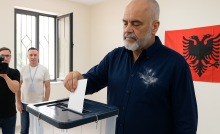Austria coalition ends five months of limbo


Austria’s centre-right People’s Party (OVP), centre-left Social Democrats (SPO) and centrist, liberal NEOs have now finalised a coalition pact after a five-month political impasse and two rounds of failed negotiations.
Members of the NEOs voted 94% in favour of a coalition deal on Sunday, 2 March, clearing the last remaining obstacle to ending Austria’s longest post-election deadlock since 1945.
OVP leader Christian Stocker will take office as chancellor, with the SPO’s Andreas Babler serving as vice-chancellor. The OVP will run the interior and defence ministries, the SPO will control the finance and justice ministries, and the NEOs will oversee foreign affairs and education ministries.
The coalition’s proposed agenda emphasises fiscal responsibility and social reform, aiming to balance conservative and progressive priorities. The deal blocks the far-right Freedom Party (FPO) from assuming power, despite its first-place finish in last September’s election. FPO leader Herbert Kickl’s post-election attempts to form a government failed due to policy disputes with the OVP, however.
Detailed programme seeks to cut deficit
Initial negotiations between the OVP, SPO, and NEOs broke down in early January over differences on fiscal policy, particularly on budget consolidation and tax reform. The deadlock prompted then-chancellor Karl Nehammer to resign, creating a vacuum that steered the OVP towards negotiations with the FPO.
However, that alliance also proved unviable. Kickl’s demands for sweeping tax reductions, increased public borrowing, and tighter EU fiscal constraints clashed with the OVP’s pro-European stance. When talks collapsed in mid-February, Stocker returned to the original three-party framework. The coalition agreement attempts to balance fiscal discipline with investment in social welfare and economic expansion.
At the core of the 211-page agreement is a 7-year fiscal consolidation strategy designed to align with EU budgetary rules and avoid an excessive deficit procedure. The incoming government has pledged to reduce expenditure by over EUR 6.3bn in 2025 and EUR 8.7bn in 2026 while introducing tax relief for middle-income earners and businesses.
Not all coalition partners achieved their desired outcomes. The SPO had advocated for higher corporate taxation and a financial transaction levy, both of which were rejected by the OVP and NEOs. Conversely, the OVP’s proposal for stricter expenditure caps and a rapid return to a balanced budget was softened to accommodate the SPO’s demands for enhanced social investment.
Pact softens FPO’s stance on immigration
The coalition’s migration stance diverges sharply from the FPO’s hard-line agenda of drastic cuts to asylum applications, the cessation of automatic citizenship for second-generation migrants, and tighter border controls. Instead, the new government will uphold stringent deportation policies while expanding integration initiatives.
This marks a significant shift in the OVP’s positioning. During its negotiations with the FPO, the conservatives had signalled openness to stricter immigration curbs, including limited welfare access for asylum seekers. That approach has now been abandoned in favour of a compromise that balances security with integration.
On foreign policy, the coalition has reaffirmed Austria’s support for Ukraine, its endorsement of EU sanctions on Russia, and its commitment to financial and logistical aid for the reconstruction of the war-torn country.
However, Austria will maintain its traditional neutrality and opposition to NATO membership, despite mounting European calls for deeper defence cooperation. Instead, the coalition agreement prioritises Austria’s involvement in EU-led security initiatives, particularly in cybersecurity and intelligence-sharing.
Meanwhile, the government remains committed to EU enlargement in the Western Balkans, a policy aimed at mitigating migration flows and countering Russian and Chinese influence in the region.
Stocker hails ‘spirit of consensus’
Stocker wrote on Facebook on Thursday “During times of great challenge, Austria has always drawn strength from the consensus of stabilising forces. This very spirit of consensus has shaped the coalition between the People’s Party and the Social Democrats. In the decisive moments of our republic, they have demonstrated that consensus and compromise do not equate to stagnation, on the contrary, they are the key to bold decisions for the future. From rebuilding our republic with its permanent neutrality to the economic miracle, EU accession, and overcoming major crises such as the 2009 global financial crisis, Austria’s greatest progress has always been achieved through consensus.
“When others shirk their responsibility, we take decisive action. This is not about party strategy: it is about Austria. With a new broad majority, we aim to develop fresh solutions through consensus. NEOS stands for forward-thinking reforms. Out of a sense of national responsibility, NEOS is therefore also part of this alliance, advocating for the reforms our country urgently needs.
“This is how Austria will overcome the current challenges: the economic pressures caused by war, inflation, energy concerns, and migration. When political forces work together across party lines and develop bold solutions through a new consensus-driven approach. New ideas, new solutions, a new way of working together,” Stocker concluded.
Babler underlines social programme
Babler wrote on Facebook on Thursday: “We agreed on a government programme and presented it together today. Of course, compromise is now above all else. It must now be about getting Austria through a difficult time. Getting Austria back on track – that’s the goal.
“Today, however, I can also proudly announce that the programme has a strong and proud social democratic handwriting. We are finally freezing rents. We get our fair share of the banks. Strengthening our healthcare system and shortening waiting times. How independent media promote and contribute to combat child poverty,” Babler wrote.
“My promise to the people of Austria is that in the future they won’t have to worry about politics, but vice versa: politics must ensure that people have a good and safe life. I wish a future government to bring Austria back to the top together – in the areas of economic policy and local politics, but also in social and social aspects.
“I place with OVP, SPO and NEOs the readiness to move forward, with a view to the whole state. Moving forward in the Austrian way, the way of good compromise that made our country great. Reliable. Constructive. Solution-oriented. No drama. Industrious. And selfless. This is good because we need a government of solutions now,” Babler underlined.
Recent Posts
Ukraine arrests pair for spying for Hungary
The Security Service of Ukraine (SBU) has arrested two Ukrainian military veterans in Zakarpattia, west…
Hungary pays neighbours to avoid blackouts: lessons from Spain’s recent energy crisis
Hungary currently leads the world for share of solar energy in its energy mix, as…
Rama set to retain power in Albania election
Albanian Prime Minister Edi Rama has claimed victory in Albania’s parliamentary election on Sunday, 11…
Bosnia’s EU accession requires pro-EU coalition – high representative
The EU can formally begin accession negotiations with Bosnia and Herzegovina (BiH) when a stable…
Estonia climbs to second in global press freedom rankings, Czechia makes top ten
Estonia has surged to second place in the 2025 World Press Freedom Index, its best-ever…
Czechia delinks from Russian oil after 60 years
Czechia has halted imports of Russian crude oil delivered via the Druzhba pipelinefor the first…


